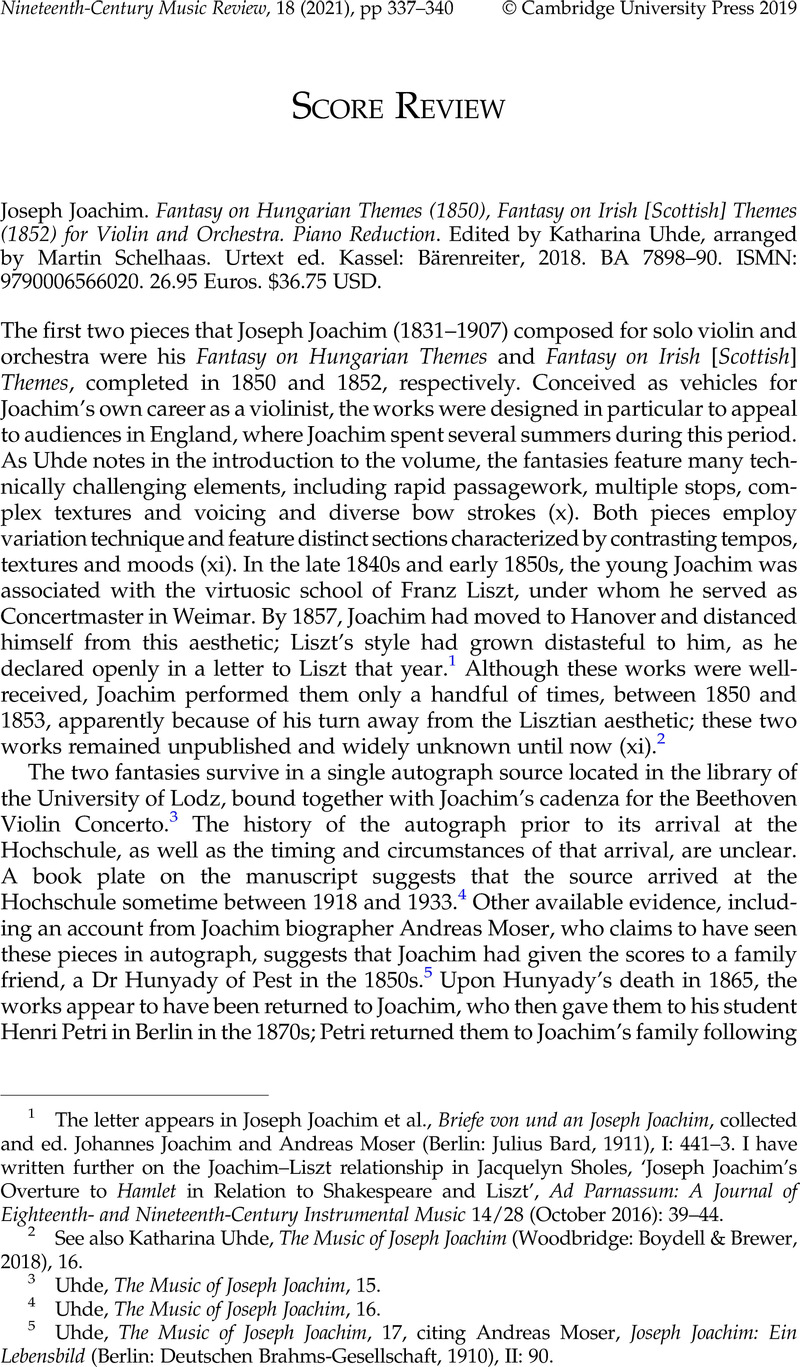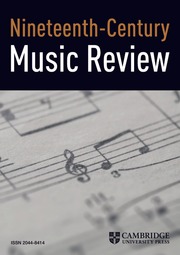No CrossRef data available.
Article contents
Joseph Joachim. Fantasy on Hungarian Themes (1850), Fantasy on Irish [Scottish] Themes (1852) for Violin and Orchestra. Piano Reduction. Edited by Katharina Uhde, arranged by Martin Schelhaas. Urtext ed. Kassel: Bärenreiter, 2018. BA 7898–90. ISMN: 9790006566020. 26.95 Euros. $36.75 USD.
Review products
Published online by Cambridge University Press: 27 November 2019
Abstract

- Type
- Score Review
- Information
- Nineteenth-Century Music Review , Volume 18 , Special Issue 2: Brahms and the Influence of Beethoven , August 2021 , pp. 337 - 340
- Copyright
- Copyright © Cambridge University Press 2019
References
1 The letter appears in Joachim, Joseph et al. , Briefe von und an Joseph Joachim, collected and ed. Joachim, Johannes and Moser, Andreas (Berlin: Julius Bard, 1911), I: 441–3Google Scholar. I have written further on the Joachim–Liszt relationship in Sholes, Jacquelyn, ‘Joseph Joachim's Overture to Hamlet in Relation to Shakespeare and Liszt’, Ad Parnassum: A Journal of Eighteenth- and Nineteenth-Century Instrumental Music 14/28 (October 2016): 39–44Google Scholar.
2 See also Uhde, Katharina, The Music of Joseph Joachim (Woodbridge: Boydell & Brewer, 2018), 16CrossRefGoogle Scholar.
3 Uhde, The Music of Joseph Joachim, 15.
4 Uhde, The Music of Joseph Joachim, 16.
5 Uhde, The Music of Joseph Joachim, 17, citing Moser, Andreas, Joseph Joachim: Ein Lebensbild (Berlin: Deutschen Brahms-Gesellschaft, 1910), II: 90Google Scholar.
6 Uhde, The Music of Joseph Joachim, 18–21.
7 Wolff, Christoph, ‘From Berlin to Lodz: The Spitta Collection Resurfaces’, Notes 35/2 (1989): 311–27CrossRefGoogle Scholar.
8 See also Uhde, The Music of Joseph Joachim, 15.
9 Uhde, The Music of Joseph Joachim and Uhde, Katharina, ‘Rediscovering Joseph Joachim's “Hungarian” and “Irish” [Scottish] Fantasia’, The Musical Times 158 (2017): 75–99Google Scholar.
10 Beatrix Borchard, ‘Joachim, Joseph’, Grove Music Online, Oxford Music Online. www.Oxfordmusic.com (accessed 1 July 2019). The pieces are, however, included in the works list of Borchard's later Stimme und Geige: Amalie und Joseph Joachim (Vienna: Böhlau, 2005)Google Scholar, cited in the present edition (xii, fn. 19).
11 See also Uhde, The Music of Joseph Joachim, 337.
12 Elsewhere, Uhde discusses Joachim's relationship with his Hungarian identity, characterizing him as ‘out of touch with his native land’, one who ‘hardly spoke Hungarian’, but felt ‘nostalgia’ and ‘reverence for his lost roots’; see Uhde,‘Rediscovering’, 97–8. See also Uhde, The Music of Joseph Joachim, 56–7.
13 Uhde, The Music of Joseph Joachim, 53–5 and 329ff. (includes comparison with Joachim's Concerto in the Hungarian Manner) and Uhde, ‘Rediscovering’, 92.
14 Uhde, The Music of Joseph Joachim, 21–23, 24 and 247.
15 Uhde, ‘Rediscovering’, 75. Elsewhere, Uhde identifies hints of ‘The Last Rose of Summer’ (partial and possibly coincidental) and finds that an additional recurring melody, Andantino in B minor, recalls music from the prologue of Donizetti's opera Lucrezia Borgia (1833); see Uhde, The Music of Joseph Joachim, 31 and 33; see also 28–9.
16 Uhde, ‘Rediscovering’, 79; Uhde, The Music of Joseph Joachim, 29–30.
17 For more on the structure of the work and its use of themes, see Uhde, The Music of Joseph Joachim, 29; see also Uhde, ‘Rediscovering’, 78.
18 Uhde, ‘Rediscovering’, 79 and Uhde, The Music of Joseph Joachim, 31, both citing Todd, R. Larry, Mendelssohn Essays (New York: Routledge, 2008), 18Google Scholar.
19 Uhde, ‘Rediscovering’, 79.
20 See also Uhde, ‘Rediscovering’, 92–7, and Uhde, The Music of Joseph Joachim, 50–56.
21 See Uhde, The Music of Joseph Joachim, 16.



